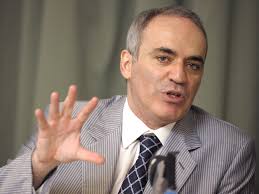
Garry Kimovich Kasparov (13 April 1963)
The life cycle 9
Important years of life
1980 9
1989 9
1998 9
2007 9
2016 9
2025 9
2034 9
2043 9
2052 9
2061 9
……
… 1980, he won the World Junior Chess Championship in Dortmund, West Germany. Later that year, he made his debut as second reserve for the Soviet Union at the Chess Olympiad at Valletta, Malta, and became a Grandmaster.
Skara 1980, USSR 2nd reserve, 5½/6 (+5−0=1), team gold, board gold;
Barcelona (World Cup) 1989, 11/16, tie for 1st;
Skellefteå (World Cup) 1989, 9½/15, tie for 1st;
Tilburg 1989, 12/14, 1st;
Belgrade (Investbank) 1989, 9½/11, 1st;
He has annotated his own games extensively for the Yugoslav Chess Informant series and for other chess publications. In 1982, he co-authored Batsford Chess Openings with British grandmaster Raymond Keene and this book was an enormous seller. It was updated into a second edition in 1989
Kasparov defeated the chess computer Deep Thought in both games of a two-game match in 1989
In 1989 he married a graduate of the philology department of Moscow State University and an interpreter of Intourist Maria Arapova
In an interview in 2007, Kasparov called the break with FIDE the worst mistake of his career, as it hurt the game in the long run
In April 2007, it was asserted that Kasparov was a board member of the National Security Advisory Council of Center for Security Policy, a “non-profit, non-partisan national security organization [in Washington, DC] that specializes in identifying policies, actions, and resource needs that are vital to American security”. Kasparov confirmed this and added that he was removed shortly after he became aware of it. He noted that he did not know about the membership and suggested he was included in the board by accident because he received the 1991 Keeper of the Flame award from this organization. But Kasparov maintained his association with the leadership by giving speeches at think tanks such as the Hoover Institution
On 14 April 2007, Kasparov led a pro-democracy demonstration in Moscow. Soon after the demonstration’s start, however, over 9,000 police descended on the group and seized almost everyone. Kasparov, who was briefly arrested by the Moscow police, was warned by the prosecution office on the eve of the march that anyone participating risked being detained. He was held for some 10 hours and then fined and released. He was later summoned by the FSB for violations of Russian anti-extremism laws
On 30 September 2007, Kasparov entered the Russian Presidential race, receiving 379 of 498 votes at a congress held in Moscow by The Other Russia.
In October 2007, Kasparov announced his intention of standing for the Russian presidency as the candidate of the “Other Russia” coalition and vowed to fight for a “democratic and just Russia”. Later that month he traveled to the United States, where he appeared on several popular television programs, which were hosted by Stephen Colbert, Wolf Blitzer, Bill Maher, and Chris Matthews.
On 24 November 2007, Kasparov and other protesters were detained by police at an Other Russia rally in Moscow. 3,000 demonstrators arrived to allege the rigging of upcoming elections. Following an attempt by about 100 protesters to march through police lines to the electoral commission, which had barred Other Russia candidates from parliamentary elections, arrests were made. The Russian authorities stated a rally had been approved but not any marches, resulting in several detained demonstrators. He was subsequently charged with resisting arrest and organizing an unauthorized protest and given a jail sentence of five days. Kasparov appealed the charges, citing that he had been following orders given by the police, although it was denied. He was released from jail on 29 November. Putin criticized Kasparov at the rally for his use of English when speaking rather than Russian
On 12 December 2007, Kasparov announced that he had to withdraw his presidential candidacy due to inability to rent a meeting hall where at least 500 of his supporters could assemble. With the deadline expiring on that date, he explained it was impossible for him to run. Russian election laws required sufficient meeting hall space for assembling supporters. Kasparov’s spokeswoman accused the government of using pressure to deter anyone from renting a hall for the gathering and said that the electoral commission had rejected a proposal that would have allowed for smaller gathering sizes rather than one large gathering at a meeting hall.
In 2007 he wrote How Life Imitates Chess, an examination of the parallels between decision-making in chess and in the business world.
On Thursday 28 April and Friday 29 April 2016 at the Chess Club and Scholastic Center of Saint Louis, Kasparov played a 6-round exhibition blitz round-robin tournament with Fabiano Caruana, Wesley So, and Hikaru Nakamura in an event called the Ultimate Blitz Challenge. He finished the tournament third with 9.5/18, behind Hikaru Nakamura (11/18) and Wesley So (10/18). At the post-tournament interview, he considered the possibility of playing future top-level blitz exhibition matches.
On June 2, 2016 Kasparov played against fifteen chess players in a simultaneous exhibition in the Kaiser-Friedrich-Halle of Mönchengladbach. He won all games
In the United States presidential election, 2016, Kasparov described Republican front-runner Donald Trump as “a celebrity showman with racist leanings and authoritarian tendencies,” and criticised Trump for calling for closer ties with Vladimir Putin, and responded to Trump’s running mate, Mike Pence, calling Putin a strong leader, that Putin is a strong leader “in the same way arsenic is a strong drink”. He also criticised the economic policies of Democratic primary candidate Bernie Sanders, but showed respect for Sanders as “a charismatic speaker and a passionate believer in his cause.